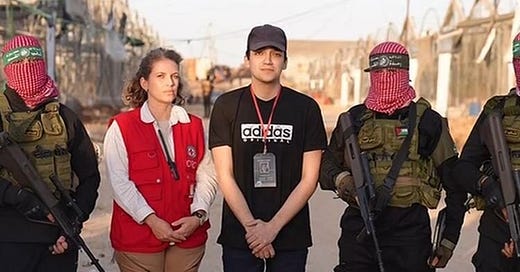Is Israel Divided on Hostages, Hamas, and Gaza?
A new survey suggests the rift may be only skin-deep.
In photo from his release, Edan Alexander stands unassisted, flanked by Hamas terrorists. (The Times of Israel)
The issue of whether and how the Israel–Hamas conflict can be ended is now front and center in Israel and seems to threaten societal unity.
One side says the war can be ended through a negotiation with Hamas in which it agrees to return all the remaining hostages and Israel agrees to a total military withdrawal from Gaza, to be followed by a lengthy ceasefire.
The other side says that’s a recipe for continued Hamas domination of Gaza and inevitable future wars and atrocities; that it’s highly doubtful Hamas would ever voluntarily agree to give up all the hostages when it views them as precious leverage against Israel; and that the only way to achieve the two goals of defeating Hamas and freeing the hostages is by ramping up military pressure on Hamas until it breaks under it.
What, then, of those many surveys finding that a large majority of Israelis support the former option of a negotiated solution—even as the government keeps tending to the second one?
In seeming contradiction to previous findings, a new survey conducted by Lazar Research for the Jerusalem Center for Security and Foreign Affairs finds
overwhelming opposition to Hamas remaining in power in any form. Some 85% of respondents said they oppose Hamas maintaining a military force in Gaza, while 81% said they oppose Hamas playing any civilian governance role.
What explains the apparent discrepancy with those earlier surveys?
The discrepancy lies in the facts that (a) Israelis have a great desire for the hostages to be freed, and (b) many of them are not realistic about what would happen after a full withdrawal from Gaza.
That lack of realism is understandable when not a few current and former military and security officials have breezily asserted that “We can always go back into Gaza and fight Hamas.”
But the assumption that Hamas would both return all the hostages and leave itself open to a renewed offensive by an IDF no longer constrained by the presence of hostages in tunnels is one that obviously—since Hamas is neither stupid nor suicidal—clashes with reality.
Instead, soberer voices say Hamas would demand a lengthy, internationally guaranteed—possibly by the UN Security Council—ceasefire to keep the IDF out of Gaza while it rebuilds its capacities to something close to what they were on October 7, 2023. The situation—opposed by such a huge majority—of Hamas retaining military and governmental power is the one that would exist.
At the time of writing, in the aftermath of the freeing of American-Israeli hostage Edan Alexander, Israeli and US delegations are on the way to Doha for a further round of mediated negotiations with Hamas. Reportedly, the aim is a deal involving the return of about half the remaining hostages and a ceasefire enabling further negotiations on a final agreement.
The chances of such an interim deal are not high and—if this analysis is right—the chances of a further, war-ending agreement are yet lower. Hamas, first, is fired by a religious ideology, and second, believes a combination of international pressure and societal pressure from within Israel will force Israel to halt the renewed offensive it is now threatening to launch if the talks fail.
If Israel is left, though, with no choice but that offensive, Hamas may well find that the society is not as divided as it may appear, and on a deeper level unity still prevails.






...and, after this evening's hit (trying) to take out Hamas leader Muhammed Sinwar, all bets are off.
...and, after this evening's hit (trying) to take out Hamas leader Muhammed Sinwar, all bets are off.